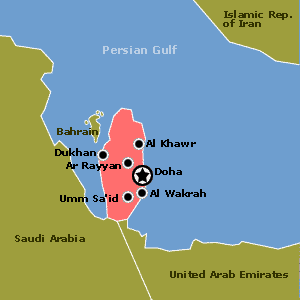Should Qatar learn from Switzerland?
- By Jin Liangxiang
 0 Comment(s)
0 Comment(s) Print
Print E-mail China.org.cn, October 19, 2012
E-mail China.org.cn, October 19, 2012

With rich oil and finance resources, Qatar is ambitious and regarded by some as a vigorous regional player. However, due to its small size and vulnerability, Qatar is far from being able to guide the course of regional issues. Instead of serving its national interests, Qatar's active meddling in the internal affairs of Arab states could be detrimental to its regional status.
Qatar's activism in international affairs dates back to the beginning of this century. Al Jazeera, a young and prominent multinational news organization, is based in the tiny country of Qatar. Though Al Jazeera was founded shortly after the emir overthrew his father's rule in the middle of the 1990s, it initially became famous for its reports about the war the United States launched against Afghanistan's Taliban and Saddam Hussein's Iraq in the aftermath of 9/11.
Al Jazeera was the only major media outlet having stable access to information about Osama bin Laden and Saddam Hussein. And the regular release of Bin Laden's voice recordings especially attracted the eyes of global audiences, and thus helped it grow into the CNN of the Arab world.
Qatar's activism can also be found when it frequently hosts important global events. In 2001, Qatar hosted a conference initiating the new round of negotiations of the World Trade Organization (WTO), which was later called the Doha round. Doha successfully held the 15th Asian Games in December 2006. In 2010, Doha was chosen as the host city of the 2022 FIFA World Cup. Doha will also hold a conference on global climate change at the end of 2012.
Every country has legitimate reasons to promote its international image in a globalized society. Qatar is no exception. And the world will always welcome any country to make contributions to global cooperation and competition.
However, it seems that Qatar's objective is not just being known to the world, and Qatar has demonstrated great interest in regional political and security issues. In many ways its active diplomacy actually reflects its ambition to become a major regional power.
In May 2008, Qatar bridged an agreement among conflicting political factions in Lebanon, thus ending the country's 18 month political crisis. In February 2009, the Sudanese government and anti-government forces reached an agreement on the Darfur crisis with the assistance of Qatar.
Qatar, though a monarchy, has been particularly active in promoting anti-government movements in Arab countries. It is one of the very few countries that have earliest recognized the transitional governments of Tunis and Egypt. It is one of the Arab countries that have strongly promoted external military interventions into Libyan and Syrian internal affairs.
It is true that Qatar's role in bridging gaps among conflicting factions of various Arab countries should be appreciated. It has also helped calm down regional instability and has prevented some crisis from growing in severity. Qatar, through these efforts, also gained recognition of regional and global powers as a major regional actor. However, its over enthusiasm in supporting anti-government forces of its neighboring countries will sooner or later undermine its own national security interests.
With its rich oil resources, Qatar sits atop the world with a GDP per capita of approximately US$100,000. It certainly has more means to engage in international affairs compared to most Arab countries.
But Qatar's vulnerability is also obvious. Qatar has a population of about 1.70 million, but only 300,000 of them are natives with citizenship, while the rest of them are expatriates from south and southeastern Asian countries. And it has a territory of only about 11,500 square kilometers. It is not only small in size, but also not cohesive by nature. Some observers even predict a pandemic would wipe out the country.
It was reported that before voting on a UN Security Council resolution on the issue of Syria in February, Vitaly Churkin, Russia's ambassador to UN, warned that Qatar risked its existence as a sovereign nation in response to a threat from the Foreign Minister of Qatar to Russia. While dramatic, the warning rings true due to Qatar's vulnerability.
Any country should have the legal right to equal participation in international affairs. But it should do so based on the calculation of national interests. Switzerland could be a good example for Qatar. Wealthy as it is, Switzerland adopted a neutral policy regarding international affairs, which is actually a reflection of a summarization of its real strength and national interests. That is one of the reasons why Switzerland has maintained a high degree of prosperity through different seasons of international politics.
Doha certainly has the right to strongly push forward external military intervention into Syria's domestic affairs. Currently, the incumbent Syrian government is having tremendous difficulty, and many are predicting its collapse. But if Bashar Assad's Syria finally subdues its internal conflicts, Doha will be in for some trouble.
The author is a columnist with China.org.cn. For more information please visit http://m.91dzs.com/opinion/jinliangxiang.htm
Opinion articles reflect the views of their authors, not necessarily those of China.org.cn.






